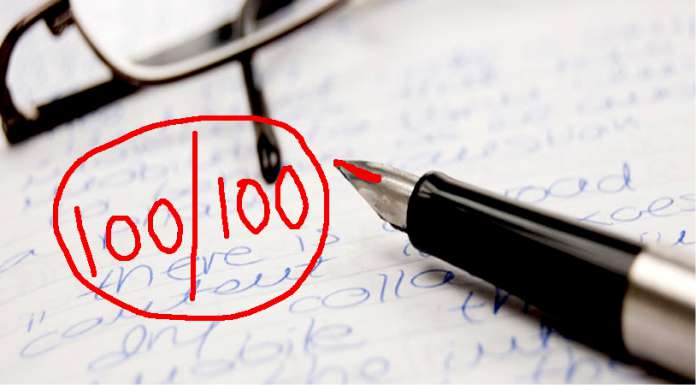Not many days had passed off the thought that how could it be possible, in the wildest of dreams, that out of 1100 marks of matriculation exams, the topper could attain 1087 in Lahore; reality as it was, but the more shocking was the result of 9th class. out of 505 total marks, a girl had scored 504, letting only a single mark unattained.

In other words, she ‘left only one stone unturned’. As the details of the mark sheet appeared on the internet, impossible could be seen with naked eyes; as there was no deduction of marks from the subjects dealing with humanities, languages, and literature. In English, in Urdu, in Islamic Studies, and in all the science subjects her score was cent per cent. One single mark was her only lose and that was in Pakistan Studies. The above-mentioned student and her alikes would definitely be impressively intelligent but despite of such wealthy marksheets released after the exams last year, a very visible question mark is raised pertaining to the very marking scheme.
See Also: Potential Genius in Pakistani Minds
Shocking result of 9th class. Out of 505 total marks, a girl had scored 504, letting only a single mark unattained
It is a known fact that in the subjects of humanities and literature hundred per cent marks are not granted. There is always a room for a better answer save those of science subjects where numerical and scientific formulae are definite. The concept is, that nothing can be declared final and best in literature and social sciences. For instance, if a student attempts to write an essay and gets twenty out of twenty marks, then how many marks would be given to a student who wrote even better?
Nothing can be declared final and best in literature and social sciences
When researched as to how the marks ratio of these exams has increased this much, it was noted that in none of the subjects the paper patterns had any considerable alterations for the past few years. In fact, the reason behind the exercise was that the marking scheme was shaken and disturbed from the very ground. Boards of Intermediate and Secondary Education had the instructions for the examiners that they would have to provide the reason for any deduction in marks. For instance, if an examiner gives fifteen marks out of twenty in an English essay, he will have to justify the following deduction by stating an argument. How far this exercise has been pragmatic can be deduced from the net result that the examiners preferred to award full marks rather than giving a reason for deduction. Its practicality is also questionable otherwise, as the number of examiners is greatly outnumbered by the number of candidates appearing in the exams. As examiner will have to be a superman to pen down the reason for every single mark deducted from each question attempted in answer sheets of, let’s say, five hundred candidates.
Examiners preferred to award full marks rather than giving a reason for deduction
One of my language teachers during my college days shared a story with our class that he once had a chance to visit an office of the board of intermediate and secondary education where the examiners were checking exam paper-sheets. One of the teachers was working like an engine, checking papers one after another, and his shirt hanged by his chair. In a meanwhile, a clerk appeared with a paper in his hand, went straight to that teacher for signature. The latter was found looking for his spectacles!
See Also: What is wrong with the educational system in Pakistan
Not all are same but many of such examiners can be ‘discovered’ without much struggle. The above-mentioned incident implies what we are expecting and with whom.
We can well attain high marks in our exams and award full grades without reasoning. However, can we enlighten the rooms in our minds specified for creativity, literature, and understanding or keep them dark with cramming? This question needs to be addressed both by our policy makers and those who implement them.
See Also: Ongoing Issues in Education of Pakistan




 EducateBox is your education news, past papers, model papers, interesting articles website. We provide you with the latest breaking news straight from the education industry. We are your all-access pass to all the A-List tutorials around the globe.
EducateBox is your education news, past papers, model papers, interesting articles website. We provide you with the latest breaking news straight from the education industry. We are your all-access pass to all the A-List tutorials around the globe.